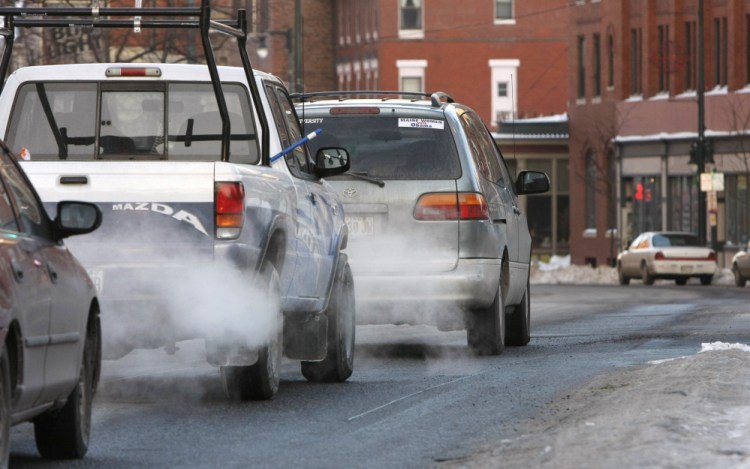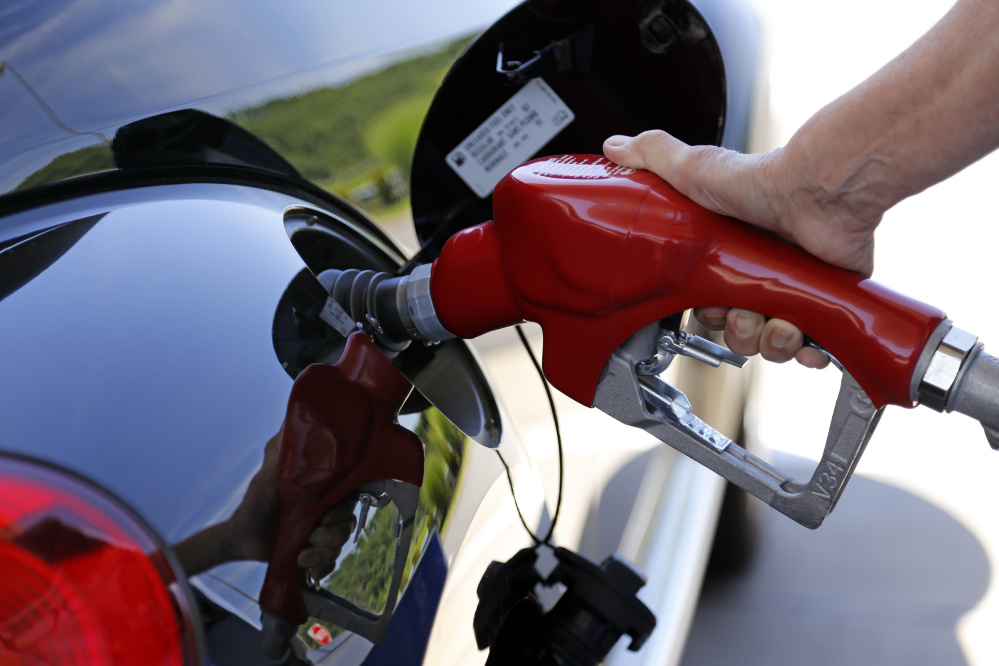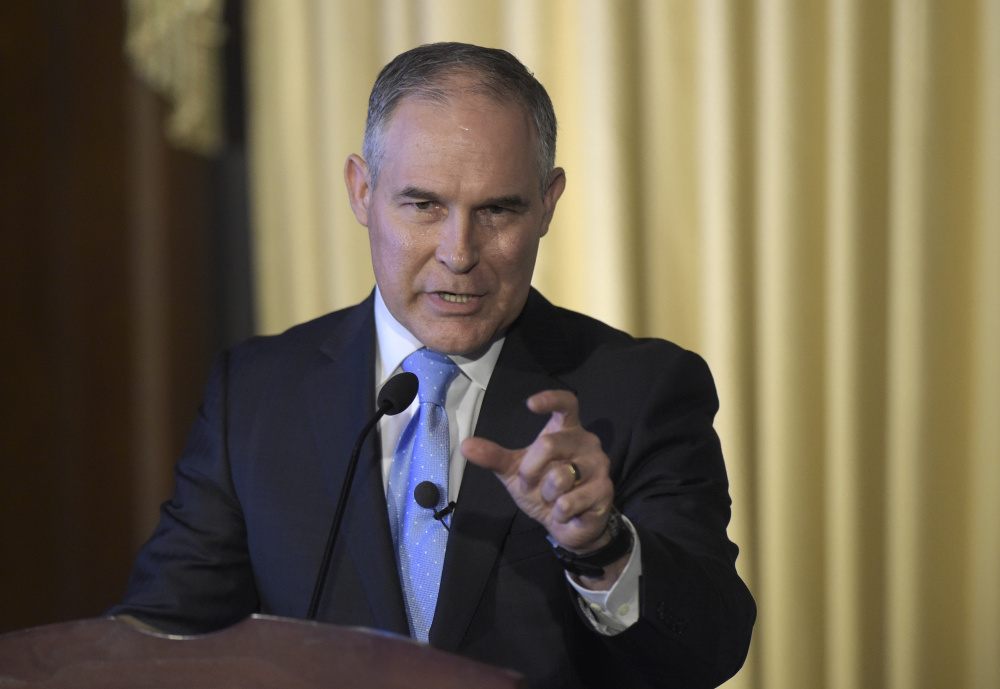Maine is prepared to fight efforts by the Trump administration to weaken or delay rules that would sharply boost fuel economy standards for new vehicles by 2025, the state’s Office of the Attorney General said this week.
Specifically, Maine will support California’s ability to set stricter fuel economy standards than those of the federal government. Those standards have been adopted by 12 other states, including Maine, but are under fire from President Trump and the Alliance of Automobile Manufacturers. They say meeting the new standards would make cars less affordable and cut manufacturing jobs.
But Gerald Reid, who heads the attorney general’s natural resources division, said regional weather patterns make Maine residents especially vulnerable to tailpipe emissions in the Northeast. Those emissions can contribute to asthma and other health problems.
“Maine has more at stake for keeping strong federal air pollution regulations than perhaps any other state,” Reid said. “We see the effects of air pollution from all the states to our south and west.”
Maine is part of a coalition of states, led by New York, that has signaled its intentions to oppose any weakening of standards that were set by the Environmental Protection Agency in 2012 under former President Barack Obama.
“We’re watching any changes in federal regulations that would hurt Maine,” Reid said. “If we determine that they would violate the Clean Air Act or any other statute, we’re prepared to go to court to stop it.”
The confrontation began taking shape in mid-March when Trump ordered the EPA to reopen a midterm review of what’s known as CAFE, or Corporate Average Fuel Economy. The Obama-era rules require automakers to deliver a fleet average equal to 54.5 miles per gallon by 2025.
Combined with a first phase of fuel economy gains initiated in 2012, the standards are expected to reduce air emissions linked to climate change by the equivalent of taking 422 million cars off the road, to cut oil consumption by 12 billion barrels and save drivers $1.7 billion at the gas pump. A previous technical review by the EPA determined the standards could be achieved by the auto industry.
Last week, California issued a challenge to Trump’s order when its clean-air agency voted to stay on track and require cars sold in the country’s largest automobile market to shoot for the 54.5 mpg target. The latest fleet average is roughly 32 mpg, so automakers would have to increase the fuel efficiency of conventional vehicles, and produce more electric and hybrid vehicles, to get those results in seven model years.
The trade group representing car dealers in Maine has misgivings about this requirement. Mainers prefer trucks and sport utility vehicles, noted Tom Brown, president of the Maine Auto Dealers Association, and the mandate might make them less available and more costly. That’s why it makes sense to step back and review the standard, he said.
“Is it achievable and is it worth it?” Brown asked. “Not just from the perspective of clean air, but the ultimate price of the product.”
AUTOMAKERS CHANGE COURSE
Trump’s executive order Tuesday to roll back Obama’s proposed power-plant pollution standards is generating national headlines, but in Maine, the battle over vehicle fuel economy may be more relevant. That’s because most of New England’s electricity comes from cleaner-burning natural gas, nuclear power and renewables – not the dirty coal plants targeted by the Obama administration.
This distinction has made transportation the region’s top contributor to air pollution and the gases linked to climate change. In Maine, carbon dioxide emissions from cars and trucks are four times greater than from electric generation, according to the U.S. Energy Information Administration.
The fuel economy standards for cars and light trucks sold in Maine from 2011 through this model year are the same nationwide. They were developed with buy-in from most automakers and from interested parties that included California, which has a waiver under the Clean Air Act to develop its own standards.
But automakers changed course after Trump took office. On March 13, they filed a federal appeals-court petition asking the EPA to re-examine the fuel standards. In response, the coalition that includes New York and every New England state except New Hampshire geared up to intervene in the case.
Two days later, the EPA and the U.S. Department of Transportation announced they were going to take a fresh look at the 2022-2025 standards. A decision is due by April 2018.
“This thorough review will help ensure that this national program is good for consumers and good for the environment,” Scott Pruitt, the EPA administrator, said in a written statement.
IMPACT ON MAINE’S STANDARDS
With that assurance, the automakers withdrew their court action March 20. That will likely put off state legal action, for now, although California is wary that the Trump administration will seek to rescind its waiver. Maine and the other states that have adopted the standards would intervene on California’s behalf if that happened, Reid said.
Challenging the California waiver would be hypocritical, in the view of Dylan Voorhees, climate and clean energy director at the Natural Resources Council of Maine.
“Pruitt’s ideology is all about states’ rights,” Voorhees said. “But that’s only for deregulating and allowing pollution, not for the right of states to enact cleaner standards.”
Maine adopted the California clean-car standards by law in 2005; it took effect in the 2009 model year.
But states can withdraw from the California standards, as Arizona did in 2012. Trump’s opposition to the tougher standards raises the question of whether Gov. Paul LePage, or a lawmaker who supports Trump’s energy and environmental policies, might introduce legislation to repeal Maine’s law.
Voorhees said he’s not aware of any effort here to change Maine law. LePage was asked about his interest in this topic. His spokeswoman, Adrienne Bennett, said the governor hasn’t received any communication from the Trump administration on the standards.
“If a review is completed and guidance is set forth to states, Maine will review the information and act appropriately,” she said.
LePage has sent mixed messages on low-emission vehicles. Last year, he announced his support for an effort to set up electric-vehicle charging stations on tourist routes between Maine and Quebec, which has an aggressive program to promote plug-ins. But he also has been critical of electric and hybrid cars, saying they don’t pay their fair share in gasoline taxes to maintain roads.
CONSUMERS LIKELY FAVOR EFFICIENCY
The standards under review set annual improvements in vehicle fuel economy. Targets for each automaker are based in part on the mix of cars and trucks sold. Carmakers can use credits earned by selling hybrids and high-mileage cars to compensate for gas guzzlers.
In Maine, hybrid and plug-in cars account for less than 1 percent of total sales. Debate over the role of these ultra-efficient vehicles obscure the fact that SUVs – the fastest-growing vehicle segment in Maine and the nation – have seen significant gains in fuel economy under the tougher standards.
EPA data for the 2015 model year show that average fuel economy for car-based SUVs increased from 20 miles per gallon in 2005 to 25.3 mpg in 2015. Averages for truck-based SUVs went from 16 mpg in 2005 to 22 mpg in 2015. Both segments also tallied record-low carbon dioxide emissions, the EPA said.
This is an important achievement, said Adam Lee, chairman of Lee Auto Mall. One of Maine’s largest car dealers, Lee is a strong promoter of fuel-efficient and electric cars, even though they now account for only a tiny percentage of sales.
In an era of low gasoline prices, Lee said buyers are more concerned about the sticker price and payments. At the same time, he knows from experience that when gasoline prices rise again, fuel economy will become a selling point.
“There are plenty of people who want to stay the course,” he said, “so that in five years, they can get an SUV that will get 35 miles per gallon, rather than 25.”
Tux Turkel can be contacted at 791-6462 or at:
tturkel@pressherald.com
Twitter: TuxTurkel
CORRECTION: This story was updated at 10 a.m. March 30, 2017 to correct the dates of the fuel efficiency standards under review by the EPA and the Department of Transportation.
Send questions/comments to the editors.





